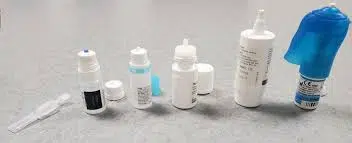EzriCare Artificial Tears Recall — Should You Be Worried About It? Let’s Break It Down
There have been some scary-sounding news stories about infection risk from artificial tears recently, specifically EzriCare Artificial Tears for dry eye treatment. The product was even recalled by its manufacturer last week after it was linked to at least one death and permanent vision loss for several others. Let’s break down what happened with EzriCare Artificial Tears, and what the news and experts have to say about the situation and what to do, if anything.
What happened with EzriCare Artificial Tears?
On January 20, the Centers for Disease Control and Prevention (CDC) announced an ongoing investigation that has spanned at least 6 months and 11 states regarding multiple different infection types, including eye infections (you can read the full statement here). According to the CDC, “epidemiology and laboratory evidence link these infections to use of EzriCare Artificial Tears,” and patient outcomes they observed “include permanent vision loss resulting from ocular infection, hospitalization, and death of one patient with bloodstream infection.” The CDC recommended immediate discontinuation of the product for clinicians and patients.
Global Pharma Healthcare, which manufactures EzriCare Artificial Tears, issued a recall of the product on Feb. 2. The CDC reported that at least 10 other brands of preservative-free artificial tears were reported by patients as potentially causing infections, but the majority of complaints were regarding EzriCare. EzriCare, LLC (which only created the product’s external label and markets it to customers, according to their statements) has issued several statements over the last couple of weeks, and made note that it had received no consumer complaints or adverse event reports linked to the CDC investigation.
On Feb. 6, the CDC announced a multi-state outbreak of infections associated with EzriCare Artificial Tears and Delsam Pharma Artificial Tears.
What does “preservative-free” mean, and why does it matter?
According to a Mayo Clinic article, eyedrops WITH preservatives often come in multidose bottles and contain preservatives that “discourage growth of bacteria once the bottle has been opened. The preservatives may irritate your eyes, especially if you have moderate or severe dry eyes.”
Eyedrops that are WITHOUT preservatives, also known as preservative-free eyedrops, have fewer additives and is recommended “if you apply artificial tears more than four times a day, or if you have moderate or severe dry eyes.” Some preservative-free eyedrops come in single-dose vials, nonprescription gels or gel inserts, or specialty multi-dose vials designed to ensure that preservative-free formulas remain contamination free.
EzriCare Artificial Tears, and the other brands of tears reported to the CDC regarding infection concerns, are distributed in regular multidose bottles, not the multi-dose vials specially designed for preservative-free drops. According to The New York Times, the CDC said that it had found the drug-resistant bacteria strain in opened bottles of EzriCare Artificial Tears collected from patients with and without eye infections, and they’re testing unopened bottles to determine if contamination occurred during the manufacturing process.
I recently used EzriCare Artificial Tears or a multiuse bottle of other artificial tears. Should I be worried?
If you’re showing any signs of an eye infection — symptoms can include discharge from the eye that is yellow, green or clear in color, redness of the eye or eyelid, increased sensitivity to light and/or eye pain/discomfort — you should visit an eye doctor or emergency room immediately, according to the CDC.
🚨 Multistate Outbreak: Infections Associated with Artificial Tears Products. If you have EzriCare or Delsam Pharma Artificial Tears Products, stop using them and seek medical care immediately if symptoms of an eye infection occur. Learn more: https://t.co/qzeGLW1QF1 pic.twitter.com/7i9BCLZgMd
— CDC (@CDCgov) February 6, 2023
I’m not showing symptoms of an eye infection, but do use eyedrops. Should I be worried?
People use different types of eyedrops for all different reasons, all over the world, every hour of every day. You should not be alarmed if you’re adhering to your eyedrop prescriptions and safely storing your medication bottles. Do not change your eyedrop regimen without consulting your eye doctor, and if you have contamination concerns, you should consult your eye doctor for best practices.


